11 Best Ecommerce Platforms for Your Business in 2024 - Shopify

This comprehensive guide to the 11 best ecommerce platforms will help you make the most informed choice for your business.
This comprehensive guide to the 11 best ecommerce platforms will help you make the most informed choice for your business.
by Alexandra SheehanAug 19, 2024 An ecommerce platform contains software for building and running an online store, and performing other retail tasks such as marketing, inventory management, and payment processing.
The best ecommerce platforms allow merchants to design unique websites and manage their businesses as they grow and evolve.
Here’s an overview of the 11 best ecommerce platforms for 2024 to help you make the right choice for your customers.
The 11 best ecommerce platforms
- Shopify
- Wix
- BigCommerce
- Adobe Commerce
- WooCommerce
- Squarespace
- Big Cartel
- Square Online
- Shift4Shop
- Volusion
- OpenCart
1. Shopify
Shopify is the world’s leading ecommerce platform. Its self-hosted software helps you sell everywhere your customers are, with features to handle all aspects of retail, from website design and product management to finances and shipping.
Why choose this ecommerce platform?
With Shopify, you can start a business from home and grow until you’re an international brand with physical storefronts (you wouldn’t be the first Shopify merchant to do so). It’s a platform that supports individual business journeys, with a single admin to manage your entire business, optimize your store, sell on social media, or explore popular retail models like dropshipping.
Plans and pricing
Try Shopify with a free trial, no credit card required. Paid plans start at $29 per month when billed annually.
Store builder
Shopify’s user-friendly store builder offers more than 100 no-code, mobile-friendly themes. Optimize unlimited product listings with the editor’s built-in AI assistant, which helps generate product descriptions and manage site content. As your business grows, enhance your website’s functionality with third-party apps or develop a completely custom online storefront.
Selling features
Shopify supports selling through your website, directly on social media and marketplaces, wholesale to other retailers, and in-person with Shopify POS. Features like abandoned cart recovery and targeted email campaigns help capture more sales, while tools for international selling make cross-border ecommerce simple.
Payment processing
Every Shopify plan includes a native payment provider that accepts all major payment methods as soon as you launch. Plus, more than 100 third-party payment providers are compatible.
Shopify’s checkout is highly customizable, letting merchants offer customers a variety of payment options, including express checkout, in-store pickup, discount codes, and Shop Pay—the best-converting checkout option on the internet.
G2 rating ⭐: 4.4
2. Wix
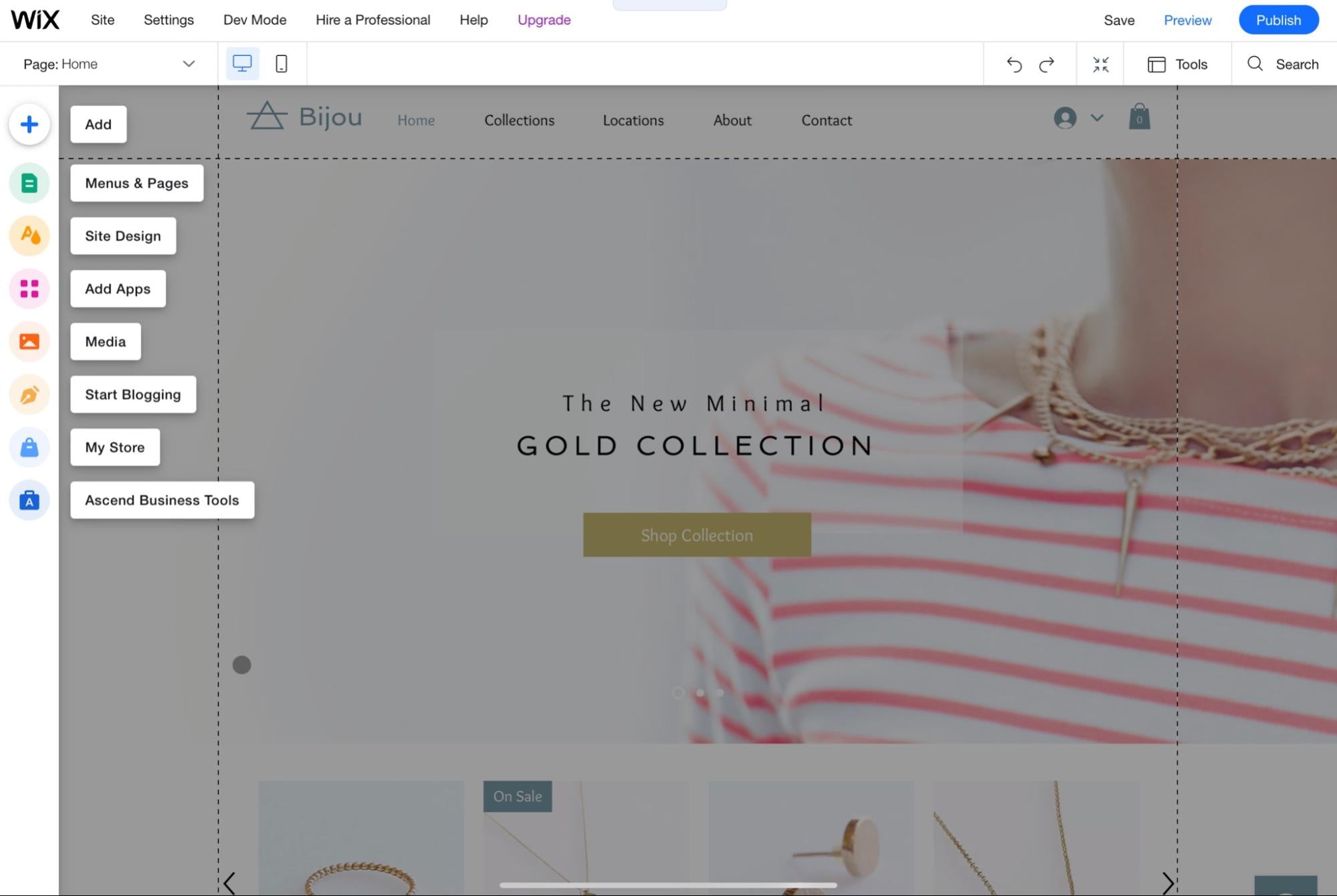 Wix is a versatile drag-and-drop website builder that offers customizable templates, web hosting, and domain name registration. While you can build a basic website for free, accessing the platform’s ecommerce features requires an upgrade to a paid plan.
Wix is a versatile drag-and-drop website builder that offers customizable templates, web hosting, and domain name registration. While you can build a basic website for free, accessing the platform’s ecommerce features requires an upgrade to a paid plan.
Why choose this ecommerce platform?
Wix is designed to simplify online selling. It allows you to accept payments, track orders, and manage inventory across multiple channels.
See how Wix compares to Shopify.
Plans and pricing
The Business Basic plan for Wix starts at $29 per month when paid annually.
Ecommerce features
Wix integrates with sales channels like Facebook and Instagram through the third-party app Ecwid. The mobile app lets you manage your website, and like Shopify, there’s a native POS system for in-person selling.
However, Wix lacks native ecommerce features that many product-based businesses need. For example, there are no built-in low-stock alerts, and other inventory management features are missing. To get those features and the ability to sell through social media, you’ll need to rely on third-party apps.
Pros and cons
- Fully hosted
- Free basic plan
- Tracking and analytics require a paid plan
- Lack of inventory management features
G2 rating ⭐: 4.2
3. BigCommerce
 Like Shopify and Wix, BigCommerce offers web hosting and customization options for your ecommerce store, as well as tools for international selling, SEO, and listing products on marketplaces.
Like Shopify and Wix, BigCommerce offers web hosting and customization options for your ecommerce store, as well as tools for international selling, SEO, and listing products on marketplaces.
Why choose this ecommerce platform?
BigCommerce is favored by enterprise-level companies for its features that support large-scale retail. However, it’s important to note that some users find the platform less flexible and user-friendly compared to others.
See how BigCommerce compares to Shopify.
Plans and pricing
Plans with BigCommerce start at $29 per month when billed annually.
Ecommerce features
BigCommerce integrates with sales channels like Google Shopping, Facebook, price comparison engines, Amazon, and Etsy. The mobile app allows you to view analytics and manage inventory on the go, although some features are Android-only. There is also no native POS system.
The need for an easy, flexible interface was a major factor in clothing brand Grace & Lace’s decision to migrate from BigCommerce. It moved to Shopify to take advantage of the platform’s seller-centric ecosystem.
Pros and cons
- Fully hosted
- Management tools for big businesses
- No native POS
- Expensive themes
- Some merchants find design tools lack user-friendliness
G2 rating ⭐: 4.2/5
4. Adobe Commerce (formerly Magento)
 Adobe Commerce is a powerful, non-hosted ecommerce platform designed for developers and large businesses that want a customizable online store.
Adobe Commerce is a powerful, non-hosted ecommerce platform designed for developers and large businesses that want a customizable online store.
Why choose this ecommerce platform?
Adobe Commerce is ideal for brands seeking a high level of customization. It offers extensive flexibility but typically requires an in-house developer to maximize its potential and maintain the site.
See how Adobe Commerce compares to Shopify.
Plans and pricing
Adobe Commerce offers custom pricing based on the specific needs and scale of your business.
Ecommerce features
The platform integrates with Amazon sales channels. However, it lacks out-of-the-box features for a seamless multichannel strategy. There isn’t an easy way to turn on social commerce or marketplace selling. The same goes for handling international transactions.
Adobe Commerce also lacks a mobile app or native POS system.
Ecommerce kids’ apparel business Character.com wrestled with a complex Adobe Commerce site before migrating to Shopify. Its website contained thousands of products and tons of integrations, making content management exhausting. After moving to Shopify, Character.com conversions increased by 40%.
Pros and cons
- Supports custom store designs
- Hosting not included
- Requires technical knowledge
- Lacks out-of-the-box ecommerce features
G2 rating ⭐: 4/5
5. WooCommerce
 Not strictly an ecommerce platform, WooCommerce is a free, open-source plugin that transforms a WordPress website into a fully functional online store.
Not strictly an ecommerce platform, WooCommerce is a free, open-source plugin that transforms a WordPress website into a fully functional online store.
Why choose this ecommerce platform?
Ideal for those already familiar with WordPress, WooCommerce integrates ecommerce capabilities into your existing blog-focused website, allowing you to add product listings, a shopping cart, and checkout functionalities.
See how WooCommerce compares to Shopify.
Plans and pricing
The core WooCommerce plug-in is free, but additional ecommerce features and website hosting may incur extra costs.
Ecommerce features
WooCommerce supports integrated sales channels and payment providers, though these integrations can be somewhat disjointed. The mobile app allows you to add products, manage orders, and view analytics. WooCommerce also offers a native POS system.
With additional paid extensions, you can use WooCommerce to create an advanced ecommerce website, including customizable themes, shipping, security, and other standard features. Both native and third-party WooCommerce extensions are available.
While some merchants appreciate this ability to choose the features they want, many find WooCommerce’s add-on structure to be a disadvantage. With different functions of your store spread across a web of plug-ins and extensions, it can be hard to keep track of how much you’re paying—and that’s on top of the cost of hosting and maintaining your WordPress website.
Pros and cons
- More than 6,000 integrations
- Active expert community
- For WordPress websites only
- Self-hosted
- Requires merchants to manage multiple costs and plug-ins
G2 rating ⭐: 4.4
💡 WordPress user? Monetize your website with the Shopify Buy Button. Embed the button and start selling for only $5 per month.
6. Squarespace
 Squarespace is a user-friendly drag-and-drop website builder that offers a sleek design and ecommerce capabilities when you upgrade to a higher-tier plan.
Squarespace is a user-friendly drag-and-drop website builder that offers a sleek design and ecommerce capabilities when you upgrade to a higher-tier plan.
Why choose this ecommerce platform?
Once upgraded, Squarespace allows you to transform your website into an online store with a secure checkout that accepts payments through multiple gateways like Stripe, PayPal, Apple Pay, and Afterpay.
See how Squarespace compares to Shopify.
Plans and pricing
The Basic Commerce plan starts at $28 per month when paid annually.
Ecommerce features
Squarespace includes inventory tracking and management features, such as the ability to print shipping labels and sell subscription products. If you’re running a Squarespace site, you can add a Shopify Buy Button for just $5 per month, allowing you to sell an unlimited number of products through Shopify’s secure checkout.
Pros and cons
- Professionally designed templates
- No transaction fees
- Not an ecommerce-focused platform
- Limited multichannel sales support
- It is hard to override theme CSS and HTML
G2 rating ⭐: 4.4/5
7. Big Cartel
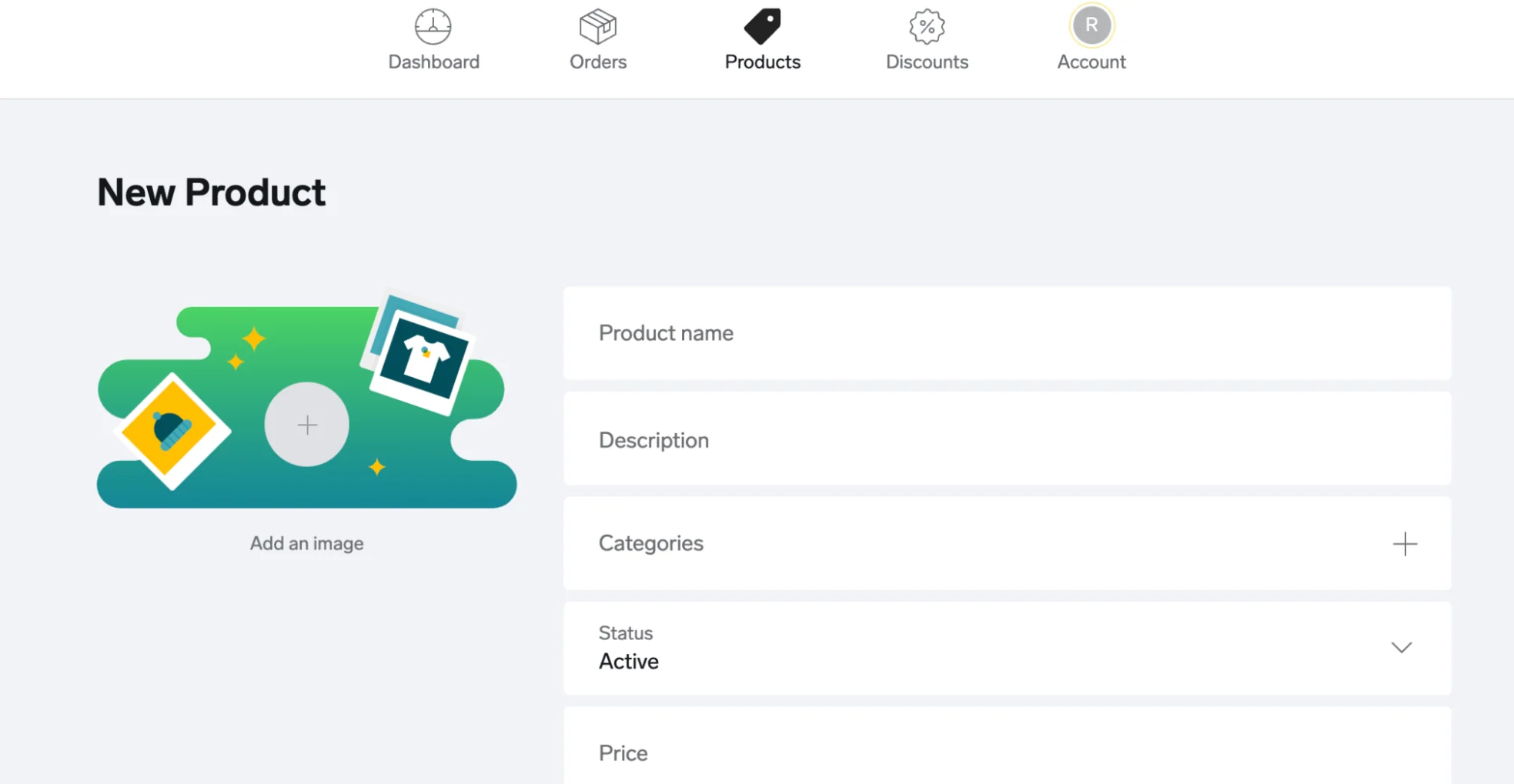 Big Cartel is a fully hosted ecommerce platform designed for artists and makers. It offers a straightforward approach to selling online with a focus on simplicity and basic functionality.
Big Cartel is a fully hosted ecommerce platform designed for artists and makers. It offers a straightforward approach to selling online with a focus on simplicity and basic functionality.
Why choose this ecommerce platform?
Big Cartel is ideal for small-scale artists and creators who need an easy-to-use platform with essential features. It offers a free plan that allows you to list and sell up to five products—perfect for those just starting out.
Plans and pricing
Start with a free plan that allows up to five product listings. Paid plans begin at $12 per month.
Ecommerce features
While Big Cartel’s free plan includes more ecommerce features than many other platforms’ free offerings, its paid plans are limited. For instance, you can only add five images per product listing, and the number of supported payment gateways is fewer than other platforms.
It’s also worth noting that Big Cartel’s pricing is based on how many products you list, so your expenses will increase as your business grows.
Pros and cons
- Free to set up and start selling
- Designed for artists and creatives
- Low levels of customization
- Lacks advanced ecommerce features
- Extra costs for larger inventory
G2 rating ⭐: 4.2/5
8. Square Online
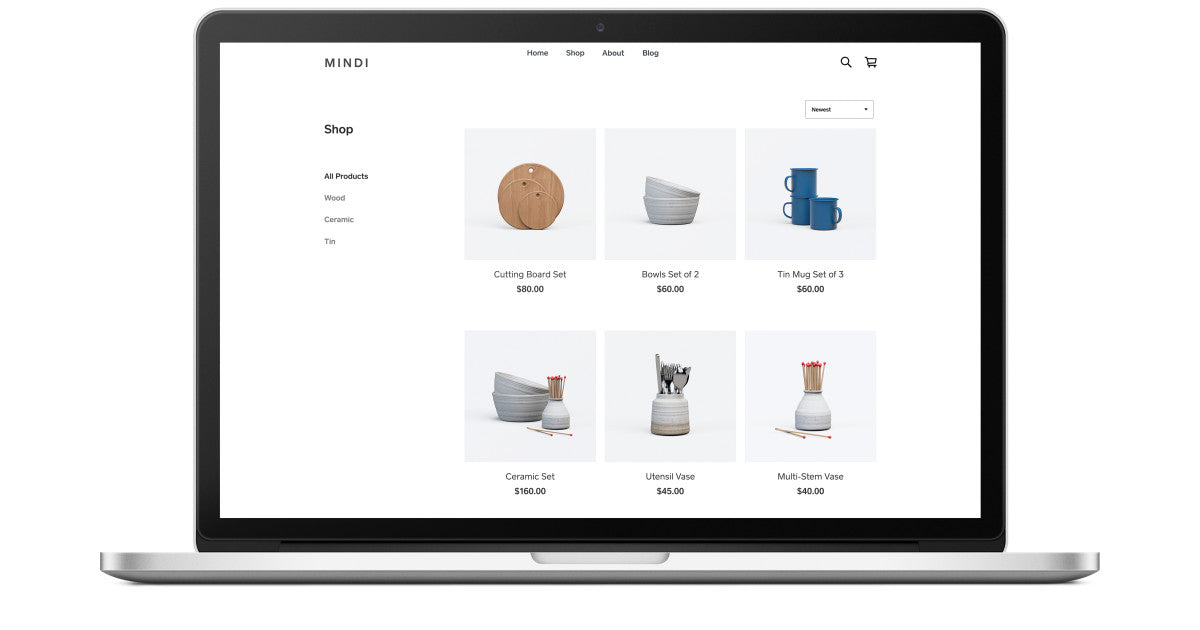 Square Online, formerly known as Weebly, is a straightforward ecommerce platform for small businesses. It integrates with Square’s payment solutions, bridging the gap between online and in-store sales.
Square Online, formerly known as Weebly, is a straightforward ecommerce platform for small businesses. It integrates with Square’s payment solutions, bridging the gap between online and in-store sales.
Why choose this ecommerce platform?
Square Online works well for merchants who already use Square for their physical store sales and want to expand online without hassle. The platform’s integration with Square’s payment system makes managing sales across different channels straightforward.
See how Square compares to Shopify.
Plans and pricing
There’s a free option available. Paid plans start at $29 per month when paid annually.
Ecommerce features
You can start building your store for free with Square Online. However, to use your own domain or remove in-app ads, you’ll need to upgrade to a paid ecommerce plan. Integrating additional sales channels and other advanced features may also be more difficult than with other platforms.
Pros and cons
- Mobile-first store designs
- Extensive free version
- Lacks advanced ecommerce features
- Primarily for Square Payments users
G2 rating ⭐: 4.2/5
9. Shift4Shop
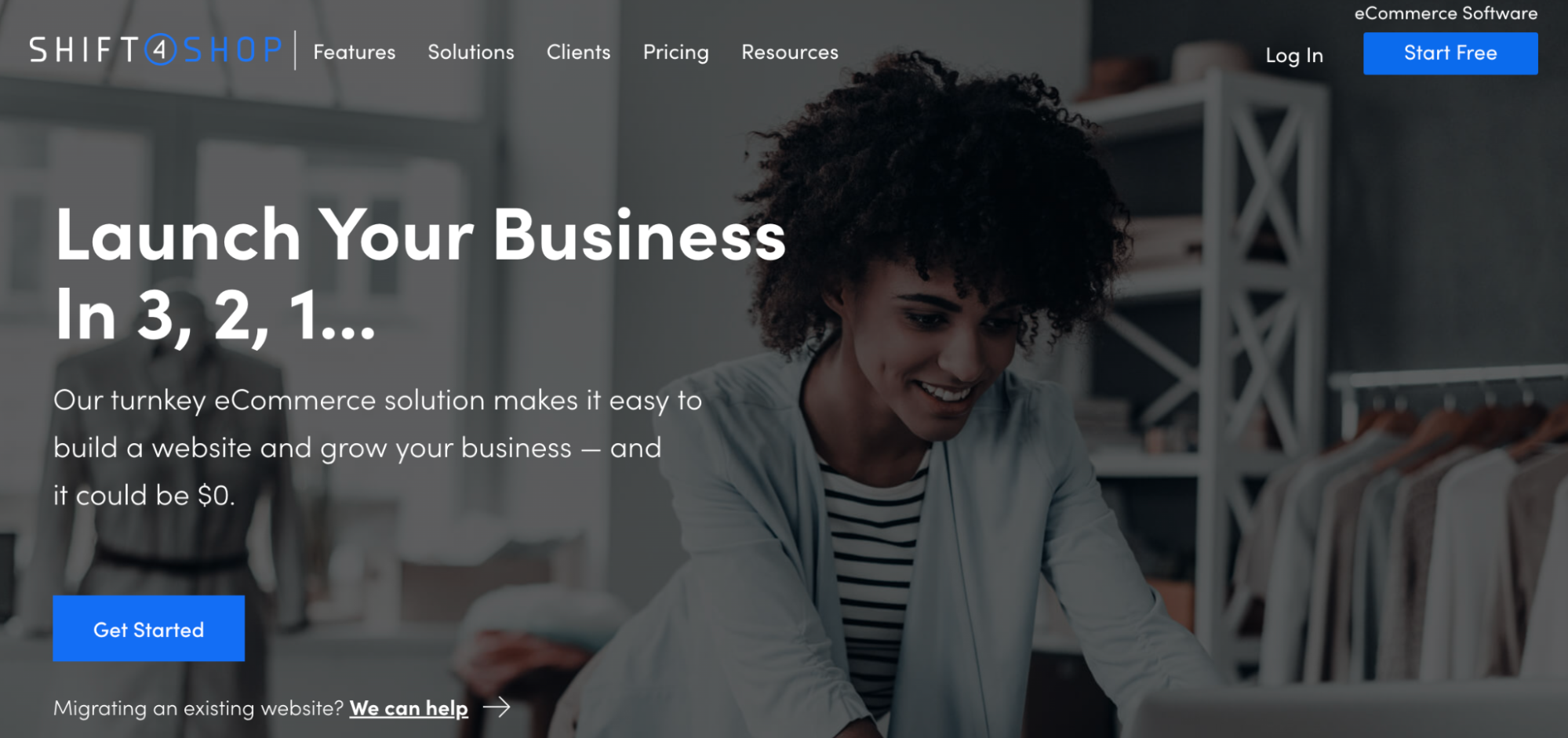 Shift4Shop is a simple tool for creating an online store, offering a straightforward setup and mobile-friendly design.
Shift4Shop is a simple tool for creating an online store, offering a straightforward setup and mobile-friendly design.
Why choose this ecommerce platform?
Shift4Shop is not packed with features, but it’s easy to use and works well for mobile users. The platform also allows you to link your store with other applications using its API, making it flexible for those who need basic ecommerce functionality.
Plans and pricing
Paid plans start at $29 per month. If you sell at least $500 each month using Shift4Shop’s own payment system, you won’t have to pay extra to use the ecommerce platform. If your earnings are less, or if you prefer to use another payment system like PayPal, the plans start at the regular rate.
Ecommerce features
Shift4Shop integrates with eBay, Amazon, and Facebook for sales channels. However, it does not offer a mobile app, and point-of-sale options are available for purchase separately.
Pros and cons
- Extensive shopping cart solution
- Ecommerce builder is free for existing Shift4Shop checkout users
- Harder to personalize your store than with Shopify
- Lack of advanced commerce features
G2 rating ⭐: 3.9/5
10. Volusion
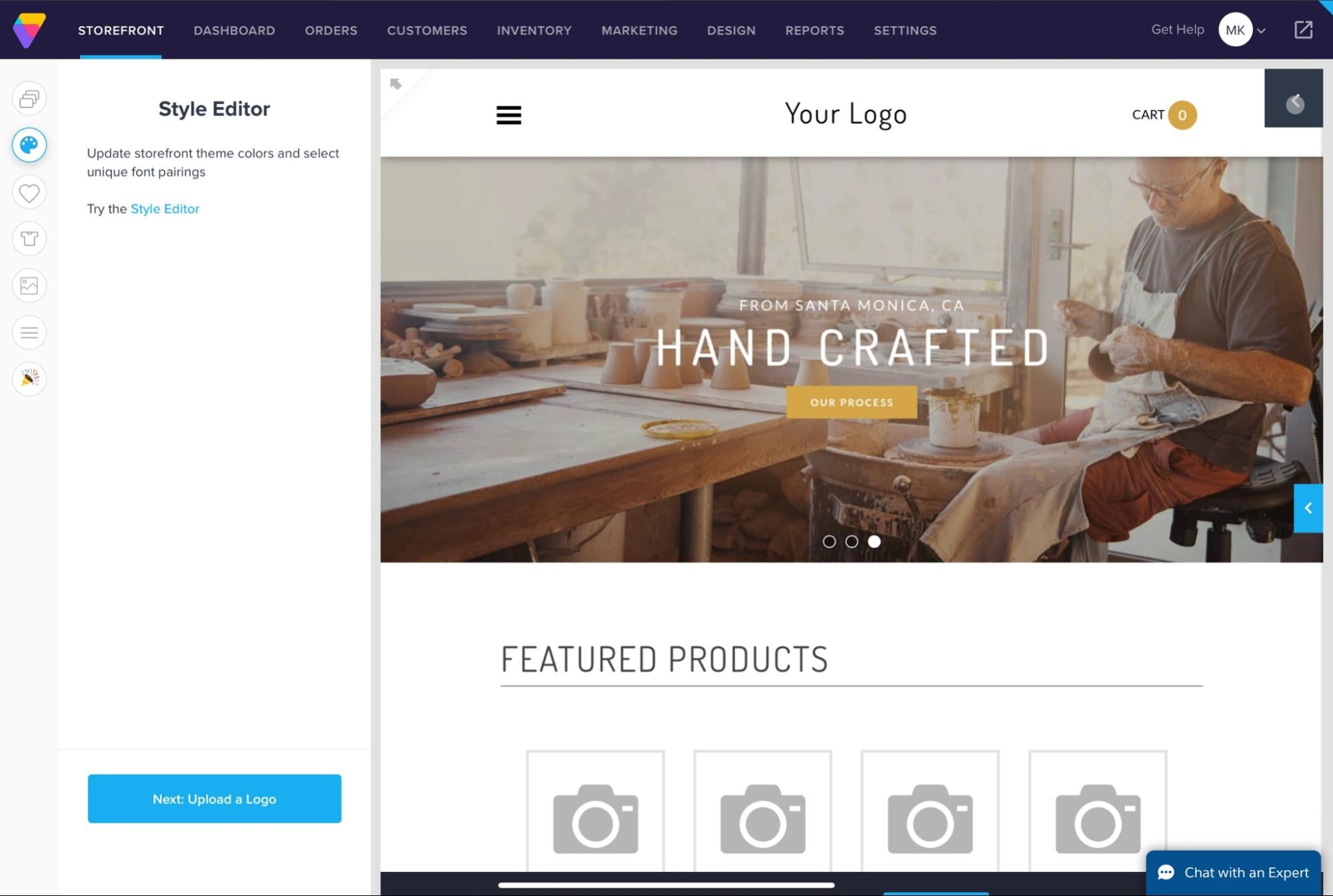 Volusion is one of the oldest ecommerce platforms, established in 1999. It’s designed to help small businesses get online with a no-frills approach to building a homepage and product pages.
Volusion is one of the oldest ecommerce platforms, established in 1999. It’s designed to help small businesses get online with a no-frills approach to building a homepage and product pages.
Why choose this ecommerce platform?
Volusion makes it easy to integrate with over 30 payment gateways and provides essential tools for creating an online store without unnecessary complications.
Plans and pricing
Plans start at $35 per month when paid annually.
Ecommerce features
Volusion’s straightforward setup allows you to focus on selling physical goods. However, the platform does not support the sale of digital products. So, if you want to sell ebooks or music, you’ll need another ecommerce solution. A mobile app, integrated sales channels, and native POS are also lacking.
Pros and cons
- 24/7 support
- User-friendly website builder
- Restricted features with the basic plan, which is still expensive
- Plans have limits for sales volume and product listings
- No free SSL security
- No support for digital product listings
G2 rating ⭐: 3.2/5
11. OpenCart
 OpenCart is a free, open-source ecommerce platform that’s simple to set up.
OpenCart is a free, open-source ecommerce platform that’s simple to set up.
Why choose this ecommerce platform?
The platform lets you create and manage multiple stores, with a dashboard that shows important metrics like sales and repeat customers.
Plans and pricing
Free.
Ecommerce features
OpenCart has more than 13,000 modules and free themes that you can build on to create your own website, along with plenty of integrations to connect your tools.
Pros and cons
- Free and open-source
- Limited marketing and sales features
- Self-hosted
G2 rating ⭐: 4.3/5
Choosing an ecommerce platform: Features checklist
If you’ve started a business and are ready to choose an ecommerce platform, it helps to put together a feature checklist. The best ecommerce software for you might differ from the best platform for another merchant—you need to consider your unique business goals and what tools will help you reach them.
When creating your checklist, consider whether you’d benefit from these popular features:
- Secure, reliable checkout and payment gateways
- Online and offline selling options
- AI assistance
- Hosting environment
- Inventory management and shipping
- Marketing and customer growth tools
- Security features
- Business and financial management features
- Support
Secure, reliable checkout and payment gateways
Checkout is a core component of your ecommerce website. You need a protected and dependable way to accept payments, while ensuring the process is quick and painless for shoppers.
Shop Pay, for instance, increases checkout speed by four times. Shopify also offers simple integrations with more than 100 payment gateways, so you can offer the most relevant payment options for your audience, no matter where they are in the world.
Plus, it’s extra important to instill trust at this stage, so you’ll want to accommodate familiar payment methods like mobile wallets and PayPal. These known platforms can make customers more comfortable providing payment information and make their checkout process more straightforward at the same time.
Online and offline selling options
A good ecommerce platform should seamlessly integrate your online and offline sales channels. This means having a physical point-of-sale (POS) system that syncs with your online store.
Also, consider the types of POS devices available. Does the platform make its own POS hardware, or will you need to use a third party? Are there convenient options for handling transactions at a pop-up event, market stall, or via your mobile phone?
AI assistance
AI is transforming how ecommerce platforms operate, making them smarter and more responsive to both merchant and customer needs. Shopify’s built-in AI, Shopify Magic, for example, can automatically write product descriptions, edit images, and adjust your site content to align perfectly with your brand’s voice.
Many of today’s ecommerce platforms also build AI into their customer support, helping users get the most out of the platform, but also providing an enhanced tool for users to add to their stores. For example, Shopify’s AI can generate personalized responses to customer inquiries, allowing you to respond quickly and effectively to your shoppers.
With Shopify’s Sidekick AI (currently in early access only), you can get real-time support for managing your store. Whether you need help setting up shipping options, tracking inventory, or understanding your sales data, Sidekick is on-hand with personal insights and recommendations. Ask it what your bestselling products were last month, or how you can promote your brand more effectively.
Hosting environment
Your domain host will affect the cost, performance, and security of your ecommerce website. A reliable hosting provider ensures your website is always accessible, loads quickly, and is protected from cyber threats.
Some ecommerce platforms, like Shopify, include hosting. Self-hosting your website brings the potential for increased control and customization, but also increases the risk of security and technical issues.
Inventory management and shipping
If you’re serious about selling, it makes sense to pick an ecommerce platform that will help you track stock levels, manage orders, and automate fulfillment.
Find a platform with robust shipping options, including the ability to integrate with courier services, offer different shipping services to customers, and handle returns.
Marketing and customer growth tools
SEO tools, email marketing tools, social media integration, and customer review functionality will help you develop an ongoing marketing strategy.
No matter your niche, you’ll need to invest time in promoting your online store and building your brand—and the right ecommerce platform will help you out. Look for advanced features like loyalty programs, personalized recommendations, and customer segmentation.
Security features
Security is paramount in ecommerce. Your platform should provide robust security features to protect your business and your customer data. This includes SSL certificates, two-factor authentication, and compliance with PCI DSS standards for secure payment processing.
Business and financial management features
The right ecommerce platform will also offer features to help you manage your business and finances. This includes sales reporting and analytics, sales tax calculation, and integration with accounting software.
Support
Finally, consider the level of customer support provided by the ecommerce platform. Look for platforms like Shopify that offer 24/7 support through multiple channels, including phone support, email, and live chat.
Self-help resources, such as tutorials and knowledge-base articles, are also great for quick fixes.
Choosing an ecommerce platform: Business needs
Beyond ecommerce platform features, also think about your business needs. Consider these aspects of your current situation and future goals:
Know your costs
While budget shouldn’t be the only deciding factor, it’s certainly important. According to Shopify research, most small business owners spend about $40,000 during their first year—and only 9% of that goes to ecommerce needs. Shopify businesses spent an average of $38,000 in their first year, while non-Shopify businesses came in closer to $41,000.
 With so many other aspects of your business to fund, it’s essential you find an ecommerce platform that won’t suck your budget dry but still has the features you need to operate and make a profit.
With so many other aspects of your business to fund, it’s essential you find an ecommerce platform that won’t suck your budget dry but still has the features you need to operate and make a profit.
When evaluating costs, look at more than just the setup and monthly fees. You’ll also want to account for payment processing fees and charges for adding third-party integrations. Remember, if hosting isn’t included, you’ll also need to figure in the expense.
Find the right ecommerce platform for your business model
Selling online takes many forms. You might sell tangible products or digital products, and other business models have emerged as well. If you dropship, for example, you’ll want an ecommerce platform that can easily connect to dropshipping suppliers.
A platform like Shopify has tons of apps you can add to your site to make selling easier for different business models. There are apps for print-on-demand and subscription businesses, for example, that make it easier to run on Shopify than other platforms.
B2C vs B2B ecommerce platforms
Similarly, understanding whether your business primarily serves consumers (B2C) or other businesses (B2B) can significantly influence your choice of an ecommerce platform.
B2C platforms should be fast, easy to use, and optimized for a smooth shopping experience. Important features include mobile-friendly designs, quick checkout, and effective marketing tools.
B2B platforms need to handle complex transactions like bulk orders and negotiated prices. They should support volume pricing, custom catalogs, and relationship management.
Consider your future business plans
While your business might have humble beginnings, you likely have a vision for where you want to take it in the future. These goals are important to think about, even if you don’t plan to become a global brand.
You might also want to add physical retail to your business. With a limited ecommerce platform, POS integrations may be cumbersome. You risk having inaccurate inventory data due to disjointed online and in-person systems.
With a platform like Shopify, everything is tracked and synced in a single place. So you’ll have accurate inventory and sales data at any time—and you can be up and running for in-person sales in minutes. You can also add services like local delivery and take advantage of the Shopify Fulfillment Network.
Many businesses need additional funding down the line. According to our analysis, as many as two-thirds of entrepreneurs pull from personal savings to fund their business in the early stages. As many as 23% borrow money from friends and family and 21% use personal loans to get started.
However, other business funding options pose less risk to personal relationships. Look for ecommerce platforms that provide assistance to merchants, like Shopify Capital small business lending.
What types of ecommerce platforms are there?
To make your online store accessible to the public, you need a hosting solution. Hosting stores your information on a server, which lets internet users visit your site and view the content.
Every website is hosted somewhere, meaning it has dedicated server space from a provider. Some ecommerce platforms have hosting built in, while others require self-hosting or open-source hosting.
Hosted (cloud) ecommerce platforms
Some website builders are hosted platforms, which means you don’t need to worry about setting up your own hosting (and the additional fees attached). Shopify stores, for example, include website hosting in every plan.
Building on a hosted ecommerce platform gives you more freedom to focus on running your business—not on putting out fires caused by downtime and the need to fix bugs. For example, all Shopify platform updates are automatic and hassle-free, so your site will always be up to date.
Self-hosted ecommerce platforms
Self-hosted or non-hosted ecommerce platforms require merchants to use their own server space or pay to rent space from a hosting provider. This complicates website management, as you’re responsible for updates, maintenance, and bug fixes. Self-hosting also requires more internal resources.
Self-hosted ecommerce platforms are typically open source, with users left to find third parties to host their website data. Third-party hosts charge fees for their services, which quickly add up. These hosting services often use tiered pricing structures, so those on the lowest plans get little customer support. This can leave you hanging at crucial sales moments, for example, during a traffic boost after some unexpected press coverage.
What are the benefits of self-hosted vs. cloud-hosted?
Self-hosted ecommerce platforms offer a high level of customization and control. Since you’re arranging the hosting of your website, you have the freedom to switch servers, modify code, and create a bespoke online store setup.
However, this comes with the responsibility of managing hosting. You’ll need to ensure customer information is always kept safe and secure, and deal with any technical issues that arise.
These key elements of ecommerce platform management are handled with a cloud-hosted solution. Built-in security measures and automatic updates ensure your online store is always running on the latest software, including security updates.
Start selling online with Shopify
While comparing ecommerce platforms, remember the goal isn’t to find the best overall software, but the platform that best suits your needs and provides an effortless online shopping experience for your customers.
Consider not just the platform’s store builder, but also any additional business tools. A cohesive ecosystem, including your online store, payments provider, POS, and business lender, can be advantageous. Shopify, for instance, provides a comprehensive suite of tools to support your business journey, wherever it takes you.
Compare ecommerce platforms
Shopify vs. BigCommerce
Shopify vs. Commerce Cloud
Shopify vs. Lightspeed
Shopify vs. Adobe Commerce
Shopify vs. Prestashop
Shopify vs. Squarespace
Shopify vs. Webflow
Shopify vs. Wix
Shopify vs. WooCommerce
Shopify vs. WordPress
Shopify vs. BigCommerce
Shopify vs. Commerce Cloud
Shopify vs. Lightspeed
Shopify vs. Adobe Commerce
Shopify vs. Prestashop
Shopify vs. Squarespace
Shopify vs. Webflow
Shopify vs. Wix
Shopify vs. WooCommerce
Shopify vs. WordPress
Ecommerce platforms FAQ
What are the most popular ecommerce platforms?
- Shopify
- BigCommerce
- Wix
- Squarespace
- WooCommerce
Is Amazon an ecommerce platform?
Amazon is not an ecommerce platform. Amazon is an online marketplace used by individuals and businesses in many countries and languages. With Amazon, you are a seller in a marketplace, while ecommerce platforms like Shopify give you the tools to run websites and retail stores, control your branding, and manage your inventory. Shopify users can list their products on Amazon, as one of many sales channels.
Which ecommerce platform is best for startups?
Shopify is the best ecommerce platform for startups, due to its ease of use, affordable pricing, and AI tools. It offers customizable templates, secure payment processing, and integrations with popular apps. Plus, it has a user-friendly interface and excellent customer support.
What are the most popular ecommerce platforms?
- Shopify
- BigCommerce
- Wix
- Squarespace
- WooCommerce
- Shopify
- BigCommerce
- Wix
- Squarespace
- WooCommerce
Is Amazon an ecommerce platform?
Amazon is not an ecommerce platform. Amazon is an online marketplace used by individuals and businesses in many countries and languages. With Amazon, you are a seller in a marketplace, while ecommerce platforms like Shopify give you the tools to run websites and retail stores, control your branding, and manage your inventory. Shopify users can list their products on Amazon, as one of many sales channels.
Amazon is not an ecommerce platform. Amazon is an online marketplace used by individuals and businesses in many countries and languages. With Amazon, you are a seller in a marketplace, while ecommerce platforms like Shopify give you the tools to run websites and retail stores, control your branding, and manage your inventory. Shopify users can list their products on Amazon, as one of many sales channels.
Which ecommerce platform is best for startups?
Shopify is the best ecommerce platform for startups, due to its ease of use, affordable pricing, and AI tools. It offers customizable templates, secure payment processing, and integrations with popular apps. Plus, it has a user-friendly interface and excellent customer support.
Shopify is the best ecommerce platform for startups, due to its ease of use, affordable pricing, and AI tools. It offers customizable templates, secure payment processing, and integrations with popular apps. Plus, it has a user-friendly interface and excellent customer support.
FAQ
Can my PC run Buckshot Roulette?
Can I Run Buckshot Roulette? To play Buckshot Roulette you will need a minimum CPU equivalent to an Intel Core i3-2340UE. However, the developers recommend a CPU greater or equal to an Intel Core i5-12400T to play the game. The minimum Buckshot Roulette download size is 0.5GB for installation.
Who can play on WPT Global?
All players are welcome at WPT Global.
Where can I play the Buckshot Roulette game?
Buckshot Roulette will release on Steam with new updates featuring gamepad support, Steam achievements, additional language support, a downloadable original soundtrack, and new items for the endless “Double or Nothing” mode.Feb 20, 2024
「BuckshotRoulette」の読み方は?
BuckshotRoulette (ばっくしょっとるーれっと)とは【ピクシブ百科事典】
Buckshot Roulette いくら?
ショットガンに込められた実弾と空包を見極めよう CRITICAL REFLEXは本日(2024年4月5日),Mike Klubnika氏が開発したPC用ゲーム「
Buckshot Roulette free online platform, Give you more than free download, what is buckshot roulette and how to play.
This site only collects related articles. Viewing the original, please copy and open the following link:11 Best Ecommerce Platforms for Your Business in 2024 - Shopify









































































































































































